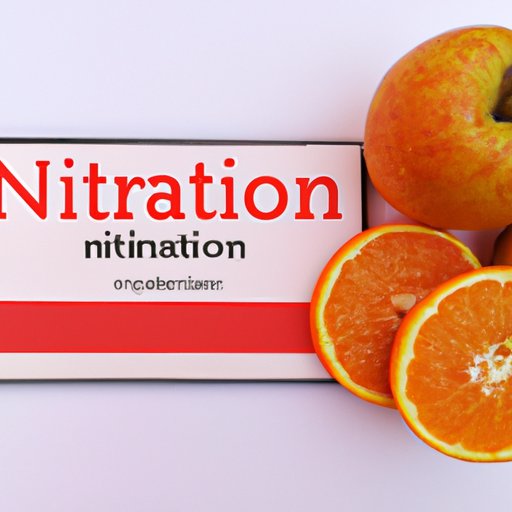
Introduction
Nutrition is the foundation of our health. It provides us with the necessary nutrients for energy, growth, and repair, as well as supporting our immune system and reducing our risk of chronic diseases. Nutrition is the study of how food affects our health and provides the necessary nourishment for our bodies.
In this article, we will explore the basics of nutrition, its importance, how it impacts our health, and how to optimize our nutritional intake for long-term health and well-being.
The Basics of Nutrition: What You Need to Know about This Basic Human Need
There are six essential nutrients that our body needs to function properly: carbohydrates, proteins, fats, vitamins, minerals, and water. These nutrients are essential for energy, growth, and the maintenance of various bodily functions.
A balanced diet is important for maintaining overall health and well-being. It must include a variety of foods from each food group, including fruits, vegetables, whole grains, lean protein, and healthy fats. A balanced diet ensures that we get all the nutrients our body needs to function properly.
Meeting your nutritional needs is important for staying healthy. You can meet your nutritional needs by consuming a well-balanced diet along with supplements if needed. Consult a dietitian or physician before taking supplements.
Unlocking the Mystery of Nutrition: A Comprehensive Guide to Understanding How Food Impacts Our Health
Nutrition plays a vital role in disease prevention. Eating a nutrient-dense diet can play a tremendous role in protecting our overall health and well-being. Nutrients play a crucial role in reducing inflammation, fighting off oxidative stress, and protecting the body against harmful pathogens and toxins.
Macronutrients and micronutrients are key players responsible for providing energy to our bodies. Macronutrients, including carbohydrates, proteins, and fats, provide the required energy to our bodies, while micronutrients, including vitamins and minerals, support overall health by promoting cellular health, nerve and muscle function, and immune system performance.
The gut-brain axis is a connection between the gut and the brain, indicating that food does not only provide us with ‘fuel’ but also impacts our mood and cognitive functions. A diet high in refined carbohydrates and low in nutrients can lead to mood swings, fatigue, and cognitive decline. On the other hand, a diet with nutrient-dense foods has mood-elevating benefits, such as reducing anxiety, depression, and improving cognitive performance.
Navigating the World of Nutrition: A Beginner’s Guide to Building Healthy Habits
Many people face obstacles when it comes to adopting a healthy diet. A lack of time, resources, and knowledge are some common barriers.
Planning healthy meals and snacks is crucial to inculcate healthy habits. Meal prepping and online grocery shopping can save time and make it easier to adopt a healthy diet.
Incorporating healthy habits into one’s lifestyle is essential for long-term benefits. Starting small with manageable changes can help maintain healthy habits. Studies have shown that small changes, such as swapping unhealthy snacks with healthier ones, can make a significant impact on overall health and well-being.
Eating for Health: The Importance of Nutrition and How to Put It into Practice
Cooking and eating nutritious foods can have tremendous benefits for our health. Healthy cooking methods, such as steaming, baking, and grilling, preserve the nutrient content of food, thus maximizing their nutritional value.
Understanding food labels is essential to make informed choices about the food we consume. Labels can help us identify the nutrient content and sources of food ingredients.
Mindful eating is crucial for optimizing the nutritional benefits of food. Mindful eating involves paying attention to the food we consume, including the taste, texture, and sensation, rather than just eating out of habit or boredom. This practice can help improve digestion, prevent overeating, and increase overall satisfaction from the meal.
Nutrition: Why It Matters, What It Means, and How to Harness Its Power for Optimal Health
Nutrition plays a vital role in overall health and well-being. It can help achieve and maintain a healthy weight by promoting a balanced diet and adopting healthy eating habits.
Nutrition plays a key role in ensuring long-term health and well-being. A healthy diet comprising nutrient-dense foods, adequate hydration, and mindful eating habits can help reduce the risk of chronic diseases and improve overall health and well-being.
Conclusion
Nutrition is a key aspect of our overall health and well-being. A well-balanced diet rich in all essential nutrients is crucial in ensuring optimal health and disease prevention. Planning healthy meals and snacks, incorporating healthy habits into our lifestyle, and mindful eating are some practices that can contribute to long-term health benefits.
Incorporating healthy eating habits may seem daunting, but starting small and making gradual changes can help make it a sustainable lifestyle. Consult with a registered dietitian or physician to determine the best plan for your unique needs.
Final Thoughts on the Importance of Nutrition
Good nutrition is a powerful tool for optimal health and well-being. It is the foundation for healthy growth and development, prevention of chronic diseases, and the promotion of overall health and well-being.




